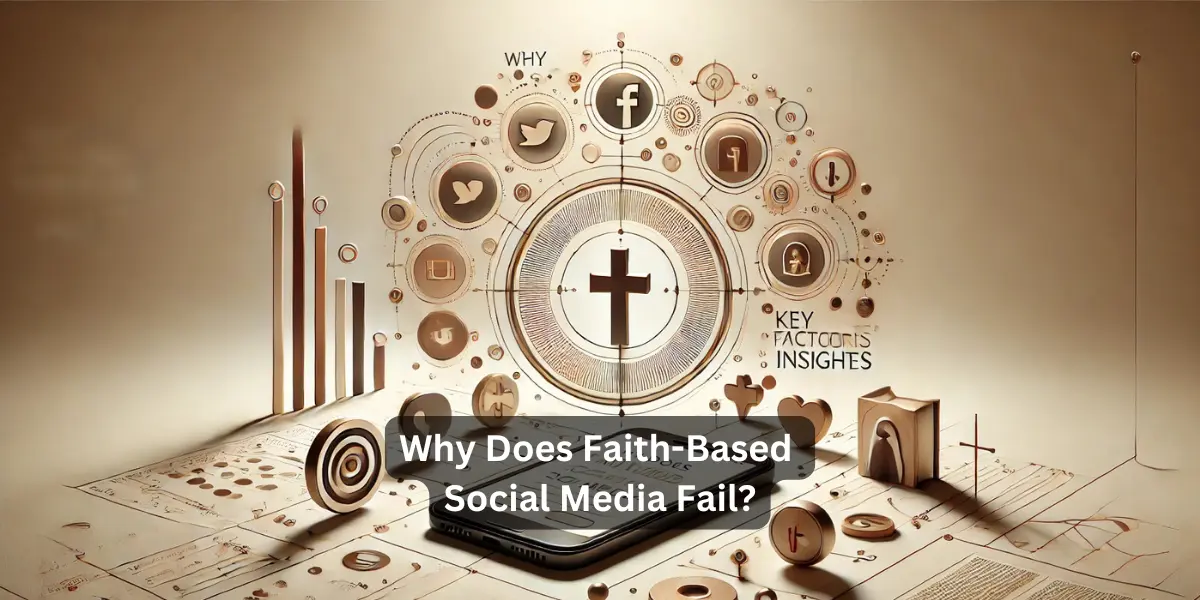
Why Does Faith-Based Social Media Fail? Key Factors and Insights
“In today’s world, social media plays a big role in how we connect, share ideas, and learn new things. For many, it’s also a place to discuss faith and spirituality. However, why does faith-based social media fail to achieve a similar positive impact that other types of online communities make in the lives of users and others? Faith-based social media often struggles with being vacuous, disconnected, or even divisive, rather than bringing people closer to their beliefs or each other.”
Table Of Content
- What Does Faith-Based Social Media Mean?
- Key factors explaining why Faith-Based Social Media fail?
- 1. Lack of Authenticity
- 2. Incoherent Communication
- 3. Commercialization of Faith
- 4. Shallow Connections
- 5. Echo Chambers and Polarization
- 6. Conflict Between Faith and Digital Culture
- 7. Performative Faith
- 8. Burnout and Skepticism of Audience
- 9. Short Term Focus of Platforms
- 10. Not adapting to changing needs.
- 11. Lack of Authority and Accountability
- Frequently Asked Questions
What Does Faith-Based Social Media Mean?
Faith-based social media, in fact, refers to the online platforms, pages, or groups of people sharing content related to their religious beliefs, values, and spirituality. This may include things like verses from the Bible, prayers, inspirational messages, religious teachings, or even discussions that really pertain to faith. It is one place where people can find those who share similar faith, ask questions, or seek support during their spiritual journey. Examples are Christian Facebook groups, prayer communities on Instagram, or religiously focused YouTube channels.
Read Also: Understanding Social Media Background Check
Key factors explaining why Faith-Based Social Media fail?
Following are various key factors of why faith-based social media fail:
- Lack of authenticity
- Incoherent messages
- Commercialization of faith
- Superficial relationships
- Bubbles and fragmentation
- Tension faith and digital life
- Performative faith
- Audience boredom and cynicism
- Short-term thinking of platforms
- Failure to evolve with community needs
- No authority and accountability.
1. Lack of Authenticity
At times, faith-based messages appear as if they are staged or too perfect to happen in real life. People want an honest, truthful true-to-life account and not some polished post that completely blinds off the fact that life knocks you down and then lifts you up again.
2. Incoherent Communication
Different groups say different things about faith, and sometimes the messages don’t harmonize. This might put people in a query as to what it is actually being communicated or what is really believed.
3. Commercialization of Faith
Some faith-based influencers and organizations commercialize faith. They are more concerned with making profits through the sale of a product or service rather than delivering a genuine, life-changing spiritual message.
4. Shallow Connections
Most people “like” or “share” posts without having a meaningful conversation that enriches each other. This becomes challenging to have real, deep discussions or even grow together in faith.
5. Echo Chambers and Polarization
Some faith-based communities online quarantine themselves among like-minded people; arguments or judgment, of course, can break out concerning those who view things differently.
6. Conflict Between Faith and Digital Culture
Social media are moving faster than ever, and sometimes one cannot share the deep, meaningful spiritual ideas in that quick, superficial way. Faith often requires a lot of time and reflection, which may not always fit well into the speed of this digital world.
7. Performative Faith
Some use faith simply to appear online, rather than acting on their faith; posting spiritual content for attention or to appear spiritually adept rather than an actual desire to serve.
8. Burnout and Skepticism of Audience
People get bored seeing the same types of faith posts, especially if they do not look genuine or meaningful. Some also begin to ask themselves whether the people behind those posts are sincere with their faith.
9. Short Term Focus of Platforms
Social media sites focus on short, quick content pieces that have a hook to attract attention quickly, but faith often needs longer, deeper reflection. It’s hard to grow spiritually in a place built for quick scrolling and fast trends.
10. Not adapting to changing needs.
Faith-based content sometimes gets stuck in the old ways and does not address the new issues people are facing today, whether it is mental health or social justice. Such content then comes across as out of touch or even irrelevant.
11. Lack of Authority and Accountability
And on social media, someone would claim to be your spiritual leader. But there are not many systems to hold them accountable for that. This, as a result, allows misinformation or bad advice to spread without being verified in any way about whether it is helpful or not.
In a nutshell, faith-based social media will have great possibilities of connecting people and inspiring spiritual growth but often falls short on so many issues like inauthentic content, mixed messages, and making popularity more of the focus rather than real, actual engagement. Consequently, lots of them seem to be competing for attention and profit rather than creating genuine space for deep, honest discussions on faith. True faith-based social media must become more authentic, and relational, but also more attuned to the real needs of the world today. Only then will it become helpful to people in their relationship with God, bringing them near unto Him as well as to one another.
Frequently Asked Questions
It can link people together, just as it can help people share their faith. Social media might enable mixed messages or even a false emphasis on religion- someone showing off as a religious person or scholar of God. Division seems to be encouraged, and deep considerations on faith are reduced.
Posting on social media itself is not haram in Islam but depends on what you post. If what you share is harmful or sinful to someone or against Islamic values, then it can be deemed haram. This, therefore, implies you share things that are respectively humble, honest, and constructive.
Social media isn’t mentioned in the Bible, but it does say love others, speak the truth, don’t talk false or hurtful words, and to talk positive encouraging words. And don’t let any thing, including social media, become that which should take Gods first place in your life.




